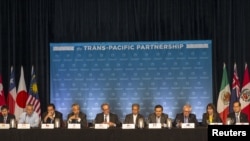The United States has called ministers from the 12 nations negotiating a Pacific trade deal for a meeting Sept. 30 to Oct. 1 in a bid to finish the pact, a
key part of the U.S. administration's engagement with Asia.
The Trans-Pacific Partnership (TPP) seeks to cut trade barriers and set common standards for 40 percent of the world economy and will be a legacy-defining achievement for U.S. President Barack Obama.
The U.S. Trade Representative said in a statement the United States would host the ministers in Atlanta. Chief negotiators from countries including Chile, Australia, New Zealand, Malaysia and Brunei will meet from Sept. 26-29.
"Trade ministers and negotiators last met in July and have been making good progress toward resolving the limited number of outstanding issues," USTR said in a statement.
The last ministerial talks, in Hawaii, stumbled over dairy trade, monopoly periods for next-generation, biologic drugs and rules of origin for autos.
Officials close to the negotiations said on Wednesday that two days of talks on the threshold for local content in auto trade between the United States, Canada, Japan and Mexico had made progress and they aimed to agree a final deal next week.
Mexico and Canada, partners with the United States in the 20-year-old North American Free Trade Agreement, have built automotive supply chains based on a threshold of 62.5 percent local content, and objected to having a much lower threshold in the TPP, which they feared would favor Asian auto parts makers
such as Thailand.
Canadian Prime Minister Stephen Harper, who faces a general election on Oct. 19, has warned that the country's auto sector will not necessarily like everything that is in the TPP.
Another sticking point is how long to protect data used to develop biologic drugs. Washington is pushing for 12 years protection, but Australia has only five and Chile has none at all.
Major dairy exporter New Zealand has made it clear it will only sign up to a deal which expands market access, putting pressure on the United States and Canada to allow in more dairy imports.





